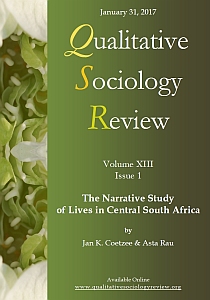Narrating Everyday Precarity: Women’s Voices from Resource Poor Areas
DOI:
https://doi.org/10.18778/1733-8077.13.1.11Keywords:
African Family Life, Precarity, Support Networks, Narrative Approach, Mangaung TownshipAbstract
African family life in South Africa’s post-apartheid context is shaped by the socio-political history of the country. Despite various attempts to address the remnants of poverty, unequal distribution of resources and the lack of livelihood services still exist. African families from resource poor areas of townships in South Africa are still faced with poverty and deprivation. Black African women, often with minimum schooling, suffer the most from these scourges. This article aims to explore the everyday life narratives of precarity at various levels and the manner in which women from Mangaung Township in Bloemfontein cope with this. They talk about the fragile relationships within the family, about the gendered dynamics of the household, and about the importance of support networks.
Downloads
References
Appolis, Christopher K. U. 1996. From Fragmentation to Wholeness: The Black South African Family Under Siege. New York: University Press of America.
Google Scholar
Barak, Adi and Ronit D. Leichtentritt. 2014. “Configurations of Time in Bereaved Parents’ Narratives.” Qualitative Health Research 24(8):1-12.
Google Scholar
DOI: https://doi.org/10.1177/1049732314541173
Benjamin, Saranel. 2007. “The Feminization of Poverty in Post-Apartheid South Africa.” Journal of Developing Societies 23(1-2):175-206.
Google Scholar
DOI: https://doi.org/10.1177/0169796X0602300211
Broodryk, Johann. 2002. Ubuntu: Life Lessons from Africa. Pretoria: Ubuntu School of Philosophy.
Google Scholar
Burrell, Gibson and Gareth Morgan. 1979. Sociological Paradigm and Organisational Analysis: Elements of the Sociology of Corporate Life. London: Heinemann Educational Books.
Google Scholar
Business Tech. 2014. Uncovering SA Employment by Race. Retrieved February 18, 2016: businesstech.co.za/news/general/68842/uncovering-sa-employment-by-race/
Google Scholar
Cavalcanti, (Keo) H. B. 1995. “The Sociology of Knowledge.” In International Encyclopedia of Sociology, edited by F. Magill. London: Fitzroy Dearborn.
Google Scholar
Chitiga-Mabugu, Margaret et al. 2014. State of Poverty and Its Manifestation in the Nine Provinces of South Africa. Pretoria: National Development Agency. Human Sciences Research Council.
Google Scholar
Connelly, F. Michael and D. Jean Clandinin. 1990. “Stories of Experience and Narrative Inquiry.” Educational Research 19(5):2-14.
Google Scholar
DOI: https://doi.org/10.3102/0013189X019005002
Dass-Brailsford, Priscilla. 2005. “Exploring Resiliency: Academic Achievement among Disadvantage Black Youth in South Africa.” South African Journal of Psychology 35(3):574-591.
Google Scholar
DOI: https://doi.org/10.1177/008124630503500311
Dodson, Lisa and Jillian Dickert. 2004. “Girl’s Family Labour in Low Income Household: A Decade of Qualitative Research.” Journal of Marriage and Family 66(2):318-332.
Google Scholar
DOI: https://doi.org/10.1111/j.0022-2445.2004.0005.x
Ettlinger, Nancy. 2007. “Precarity Unbound.” Alternatives 32(2007):319-340.
Google Scholar
DOI: https://doi.org/10.1177/030437540703200303
Gilbert, Kathleen R. 2002. “Taking Narratives Approach to Grief Research: Finding and Meaning in Stories.” Death Studies 26(3):223-239.
Google Scholar
DOI: https://doi.org/10.1080/07481180211274
Herrmann, Peter and Laurent J. G. van der Maesen. 2008. Social Quality and Precarity: Approaching New Patterns of Societal (Dis) Integration. University College Cork, Department of Applied Social Studies. MPRA Working Paper No. 10245.
Google Scholar
Kaseke, Edwell. 2010. “The Role of Social Security in South Africa.” International Social Work 53(2):159-168.
Google Scholar
DOI: https://doi.org/10.1177/0020872809355394
Kimani, Elishiba and Kisilu Kombo. 2010. “Challenges Facing Nuclear Families with Absent Fathers in Gatandu North District, Central Kenya.” The African Symposium: An Online Journal of the African Educational Research Network 10(2):11-25.
Google Scholar
Kovalainen, Anne. 2004. “Rethinking the Revival of Social Capital and Trust in Social Theory: Possibilities for Feminist Analysis.” Pp. 151-171 in Engendering the Social: Feminist Encounters with Sociological Theory, edited by B. L. Marshall and A. Witz. New York: Open University Press.
Google Scholar
Lukhele, Andrew K. 1990. Stokvels in South Africa: Informal Savings Schemes by Blacks for the Black Community. Johannesburg: Amagi Books.
Google Scholar
Møller, Valerie. 2010. “Strengthening Intergenerational Solidarity in South Africa: Closing the Gaps in the Social Security System for Unemployed Youth – A Case Study of the ‘Perverse Incentive.’” Journal of Intergenerational Relationships 8(2):145-160.
Google Scholar
DOI: https://doi.org/10.1080/15350771003745114
Neilson, Brett and Ned Rossiter. 2006. “From Precarity to Precariousness and Back Again: Labour, Life and Unstable Networks.” Variant 25:10-13.
Google Scholar
Russell, Margo. 2003. “Understanding the Black Household: The Problem.” Social Dynamics: A Journal of African Studies 29(2):5-47.
Google Scholar
DOI: https://doi.org/10.1080/02533950308628674
Sekhampu, Tshediso J. 2012. “Poverty in a South African Township: The Case of Kwakwatsi.” African Journal of Business Management 6(33):9504-9509.
Google Scholar
DOI: https://doi.org/10.5897/AJBM12.619
Standing, Guy. 2011. The Precariat: The New Dangerous Class. London: Bloomsbury.
Google Scholar
DOI: https://doi.org/10.5040/9781849664554
Statistics South Africa. 2015. Quarterly Labour Force Survey: Quarterly 3. Pretoria: Statistics South Africa.
Google Scholar
Taiwo, Afisi O. 2010. “Power and Womanhood in Africa: An Introductory Evaluation.” The Journal of Pan African Studies 3(6):229-238.
Google Scholar
Thomas, Gary. 2009. How to Do Your Research Project. London: Sage.
Google Scholar
Van Wormer, Katherine, Charletta Sudduth, and David W. Jackson. 2011. “What We Can Learn of Resilience from Older African-American Women: Interviews with Women Worked as Maids in the Deep South.” Journal of Human Behaviour in the Social Environment 21(4):410-422.
Google Scholar
DOI: https://doi.org/10.1080/10911359.2011.561167
Waite, Louise. 2009. “A Place and Space for a Critical Geography of Precarity?” Geography Compass 3(1):412-433.
Google Scholar
DOI: https://doi.org/10.1111/j.1749-8198.2008.00184.x
Webster, Leonard and Patricie Mertova. 2007. Using Narrative Inquiry as a Research Method: An Introduction to Using Critical Event Analysis in Research Learning and Teaching. London: Routledge.
Google Scholar
Wills, Jerry W. 2007. Foundations of Qualitative Research: Interpretive and Critical Approaches. London: Sage.
Google Scholar
DOI: https://doi.org/10.4135/9781452230108
Downloads
Published
How to Cite
Issue
Section
License

This work is licensed under a Creative Commons Attribution-NonCommercial-NoDerivatives 4.0 International License.











